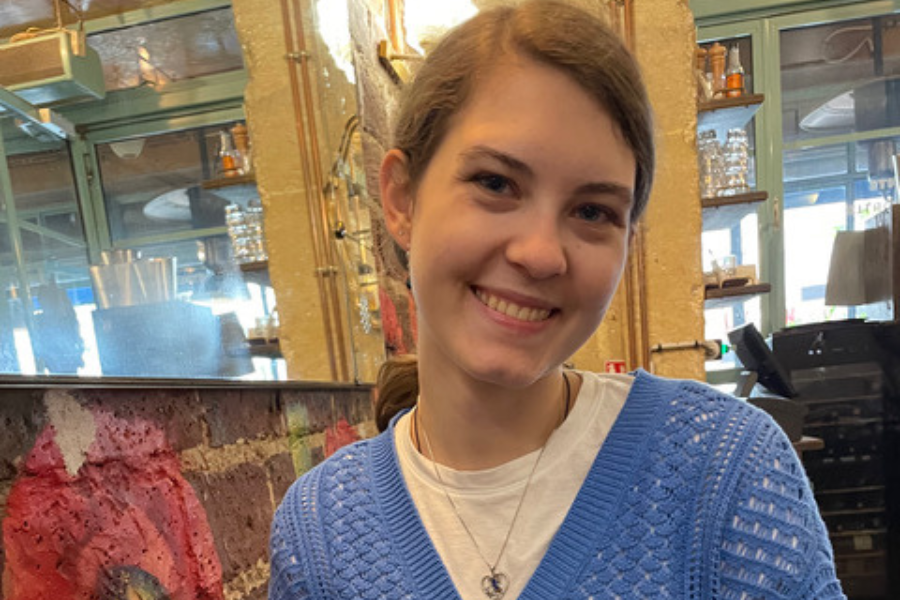Ready to step into the footsteps of a college student who studied abroad in Ireland? We recently caught up with AIFS Abroad program participant Lauren from the University of Northern Colorado. She chose to spend her fall semester studying abroad in the city of Maynooth after a summer program in Limerick!
Read on to learn more about her study abroad experience with AIFS Abroad and the impact of being an international student in Ireland.
Brett: Hi, my name is Brett. Welcome back. I am a senior at Flagler College in Saint Augustine, Florida, and I study Spanish and International Studies with a minor in Pre-Law. I studied abroad with AIFS Abroad in Granada in the spring. Would you tell us a little about yourself and where you studied abroad?
Lauren: My name is Lauren, and I’m a theater studies major with a certificate in theatrical design and technology, I minor in American Sign Language and History at the University of Northern Colorado. I’m from Aurora, Colorado, and I just graduated [during] my study abroad semester, so I’m super excited about that.
I went to Maynooth University in Ireland. I picked Ireland because I visited there in 2023, and it was such a beautiful country. I also needed an English-speaking country because I don’t speak another verbal language. I had a friend who studied there over the summer last year, and I was just really excited to see what else Ireland had to offer.
Daily Life in Maynooth
Lauren: I was in Maynooth, near Dublin. On a school day, I lived in an apartment with three other girls—one of whom was my younger sister, actually. She also did the study abroad trip with me, which was an incredible experience to do together. It was the four of us in an apartment. We had a full kitchen, full living room, and we each had our own bedroom and bathroom.
In America, [classes] tend to be on a Monday-Wednesday-Friday or Tuesday-Thursday [schedule], but in Ireland, it’s not like that. You might meet once on Monday morning and then again in the afternoon, or you meet on Tuesday and Wednesday night, or even Monday, Tuesday, and Wednesday. It was a very weird schedule, so every day was different.
I had several friends. It was me, my sister, and our closest friends who were actually German study abroad students, so we learned a lot about Germany. We also had a Canadian friend, so we would usually meet up for lunch. After class, we would either go to the student union or back to our apartment. Sometimes, we went into Dublin—it was about a 45-minute bus ride from Maynooth. Lots and lots of buses. I got very used to that. We don’t have that kind of public transit [in Colorado], so that was really interesting. Nobody had a car, but there was always lots to do in Dublin—it’s the capital of the Republic.
Brett: I feel like as an American, figuring out a country’s transportation system is such an accomplishment. Once you get used to it, you don’t even have to think about it. But I figured it out, and it makes things so much easier—you just hop on a train and pay €2 or €3, and that’s it.
Lauren: And the funny thing was all the other Europeans were like, “Ireland’s public transportation is terrible.” And I [thought], “What are you talking about? This is incredible!”
Traveling without Parents for the First Time
Lauren: I grew up traveling a lot, mostly within the States. I had been to the U.K. twice before with my family, and then my sister and I went to Ireland alone, so I had been on a plane alone before.
Figuring out an entire city and place by yourself is really crazy. Luckily, I had a lot of support from my AIFS [Program Director] and great friends.
My parents came to visit us over Christmas. We ended up staying an extra week. It was kind of funny because I planned their whole trip. I was like, “I know Dublin… we’re doing this and this and this,” and I got the tickets and their bus cards. It was so weird because they’ve always planned our trips [since] I was a kid. So, that was a really bizarre experience to be the one who knew what was going on.
Brett: Yeah, it’s definitely an accomplishment to get to that point. When you have the opportunity to make it your own and travel by yourself, you always make it work. It’s just having that confidence in yourself and being able to show your family these are all the things I learned, and these are all the things that I’m capable of now.
Traveling Beyond Ireland
Lauren: My sister and I went to Paris over our fall break, which was absolutely incredible. We [went to] the Louvre and the catacombs. I was so sad because Notre Dame was just three weeks away from being reopened when we were there. But we still got to see the outside and so many [other] cool things there.
We also went to London and Oxford with a friend. We were excited about Bath because we’re big Jane Austen fans, and that’s where she wrote Pride and Prejudice, our family’s favorite [book]. So we got to see all of that and the Roman Baths. We went to Scotland at the end as well.
Brett: I’ve heard great things, but I didn’t make it to Scotland. I went to Dublin, I went to Ireland, but Scotland was on my list. And everyone was like, you have to go. I’ve heard it’s beautiful.
Lauren: Yeah. It’s amazing.
Tackling Study Abroad Nerves
Lauren: I definitely had some [anxiety before leaving]. This was the longest amount of time I was away from my family ever. Even when I’m at university, I’m an hour away from my parents, so I see them at least every three weeks, if not more. So [I knew] being gone for a little over three months was going to be quite a challenge. I was worried about that and a little worried about whether I would make friends and if I would like my classes.
I called my parents every week, and we FaceTimed, so that was all pretty good. Other than that, it was just remembering that I’ve been doing college by myself. I make it through on a day-to-day basis, and I’m still alive. It’s just in a different place. [I knew that I was] going to figure it out—there wasn’t really another choice. I was going to be in another country.
Also, knowing that I had support from AIFS Abroad was super helpful. I had our Program Director there if anything went wrong, and that assuaged a lot of my fears. There’s a lot less handholding on a European campus. They’re kind of like, “Yep, you’re a grown-up, go do stuff,” like there’s no RAs or anything. So having that extra layer of support was very helpful in alleviating that anxiety for sure.
Brett: Definitely. AIFS Abroad does a great job of making sure that everyone feels comfortable during that transition time. When I got to Spain, we landed in Málaga, and Alberto, the Program Director, was standing there with a big sign. We all got on the bus from the airport, and they drove us from Málaga to Granada. The whole time, he was telling us all the things we would experience, what we would learn, what we would see, and how great the school was. It’s comforting to have them there because if something does happen, you’re not alone. They have resources and things like that, but it’s definitely less handholding and more of a “go figure it out” approach.
I didn’t live on campus—I lived with a host family, which, once you get past the first few weeks of living in a stranger’s house, becomes comforting because they start to feel like your family. You feel like you have that support system in a similar way. But it’s very much like, “Okay, go to school, do your homework, study, do whatever you want.” It’s not like they’re actually your parents.
But the AIFS Abroad team does a great job. I don’t even know how they can do better—I can’t think of any improvements. And from all of the experiences I’ve heard, everyone says that the on-site staff in the host country makes all the difference.
Lauren: Absolutely.
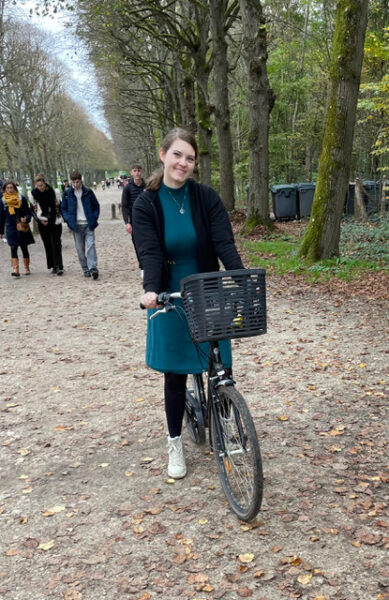
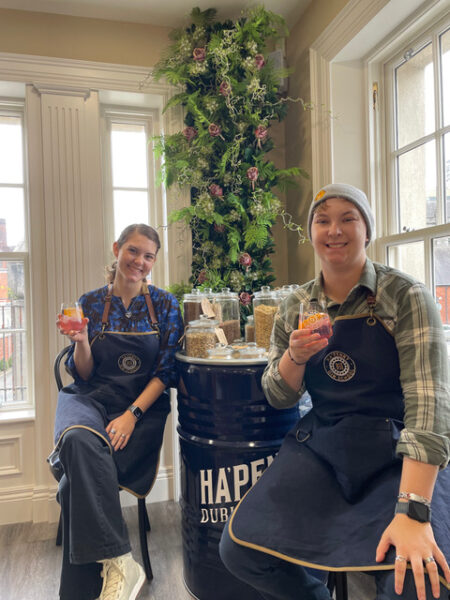
Favorite Memories from Studying Abroad
Lauren: I think the moment that really stands out to me when I take a minute to reflect was when we had our German and Canadian friends over for a culture night at our apartment. Everyone came over, and we all made food from our countries. We listened to music from everyone’s country, and we watched funny videos that, if you’re a teenager or a young person in that country, you’ve definitely seen.
That was really special. It was a simple night, but [we created] unique connections. These were people we were getting closer to, friends we’d been talking about our countries with, and we wanted to experience more of each other’s cultures. Obviously, we couldn’t travel to each other’s homes, so we brought our cultures to each other.
Of course, I could talk for hours about all the other things I did and the specifically Irish experiences I had. But I think meeting the people is really what made it for me.
Brett: Definitely. And then you have those connections that don’t end when your semester ends. You can have reunions, travel together, or just continue learning about different cultures. And you never know who you’re going to meet. You could sit next to someone on a bus and just start talking to them. But those are the people I remember—the ones you meet along the way.
Advice for Future Study Abroad Students
Lauren: The most practical advice is to pack light! Because getting everything home was quite the adventure.
But my more personal advice is don’t be afraid. I know that sounds ridiculous because you’re going to be afraid. It’s a big thing—to go far away, to be around people and cultures you don’t know. But it’s an opportunity. And the best moments often come from the things that scare you. If you’re scared to climb a tower, explore ruins, or figure out the bus system, those moments are often the best parts. You get the satisfaction of saying you did it, which is amazing. And you’re building memories with the people around you. Those are experiences you’re never going to forget.
So maybe my advice should be to do it even if you’re scared. Because you will be scared, but it’s so worth it.
Brett: And there’s always a flight home! Worst-case scenario, you can go back. It’s only a few months, and while that might seem like a long time, in the grand scheme of things, it’s temporary. But the experiences, memories, and learning opportunities stay with you for the rest of your life.
The other thing that helped me was remembering why I chose to do it. And I feel like that just helps people. I remember why I want to do this, the things that I’m trying to accomplish, and the things that I want to learn, and then my perspective changes.
I completely agree. It is scary, but I feel those risks are worth it in the long run. I remember leaving my parents at the airport, and I was like, “I don’t know what I’m doing. I don’t know about this.” And I had been so excited before. And in that moment, I had those thoughts: “I don’t know what I signed up for. I don’t know what I’m going to do.” But now I look back on it, and I remember that feeling, and all of the memories and experiences and the things I learned just overpower that initial fear. It’s all around just a great experience.

Dealing with Culture Shock Abroad and Reverse Culture Shock Back Home
Lauren: In Ireland, both the academic culture [and] the class schedule is different. The grading system is also different. Technically, it’s a scale of 0 to 100, but you cannot actually get higher than 75, [which is] an American A because of how they grade it. So it was really weird to be getting back assignments that I had a 60 on because I’m very high achieving, I hate getting less than an A—it drives me crazy. So that was really hard to adjust to. And it’s much more laid back. [For example,] my friend was asking her professor, “Can we have the instructions for this assignment?” And he was like, “Relax, it’s not due for weeks.” And we [thought], “No, can we do it though?” So that was very different.
Everyone in Ireland is super nice. And I mean, not that people aren’t nice in Colorado, but it’s just a different vibe. Even the bathroom stalls are different. And, the biggest thing—[Ireland is] a huge proponent of the environment. I totally get why there are no paper towels in any of the bathrooms, only air dryers. [But] I think that was the hardest thing for me because my hands were always damp. So, stuff like that was definitely culture shock when I got there.
Coming back—this is going to sound so stupid—I had a really hard time with doors. Because in America, I understand what a push and pull door look like—the handle usually tells you. In Europe, it can look like it’s a pull door, and it’s a push door. But stuff like that, and coming back [home] and just being in a house with my car… realizing when I was in Ireland, we would pass gas stations on the bus, and I was like, “Oh, I should remember where this is.” And then I [remembered], “I don’t have a car. It doesn’t matter.” That was really weird. There was a lot of stuff that, coming back to America, I was like, “This feels weird now,” for sure.
Brett: I completely agree with you on the grading. I also kind of had that initial panic because I’m the same way with my grades. And when the Spanish system is 0 to 10, we got assignments back and I would ask the professor, “An eight is what?” And she’d say, “Okay, you need to calm down. It’s not the end of the world, that’s good.” But not seeing a 90 and seeing something like an eight, [I’d wonder], “Did I do well?”
And, yeah, coming back is hard. For me, it was the language. My classes were taught in Spanish, [and in my daily life I spoke] mostly Spanish. And coming back here and then everything being in English, I was like, “That doesn’t sound right.” … Some people would say things, and I said, “I don’t [know what] you’re talking [about].” So it kind of came back after a while, but the transition is hard. Even the food—I came back and thought, “This is not the same.”
Lauren: I miss my Irish milk.
Brett: I miss all of it.
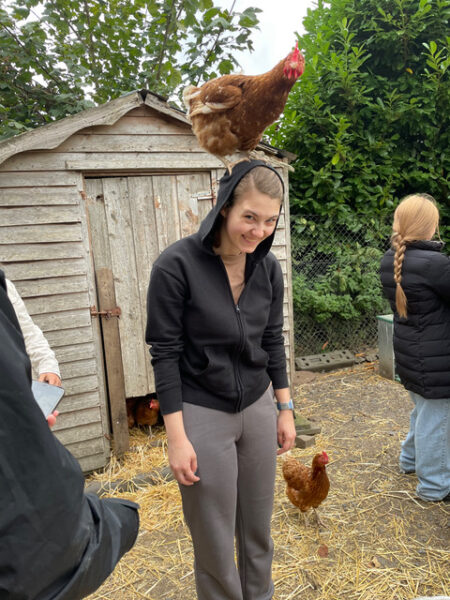
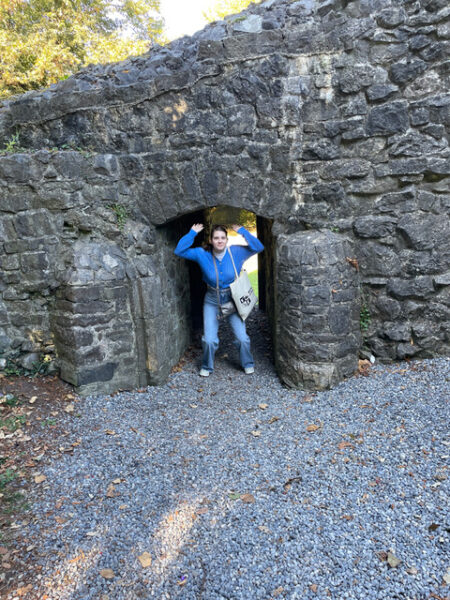
How Does Studying Abroad Impact Your Worldview?
Lauren: This experience completely changed my worldview. I’ve always tried to have an open mind and learn about other cultures, but I had never experienced them or met many people [from other countries]. So, meeting people and talking to people who were completely different… and this is going to sound weird, but actually cognitively realizing that people live in other countries and have other experiences—it felt like it finally sunk in. And just learning about different countries—about Ireland, Germany, and Canada—and their views of America and their own country, and how they live on a day-to-day basis.
Hearing how much their experiences can differ, even within [western] culture—that when you get down to it, it still is quite different—that was just so eye-opening. So now I want to travel even more. I really want to go to Germany and see my friends and see what they’ve been talking about. I want to go to Canada. I want to see so many other places around the world.
Like I was saying, [going abroad is] super scary at the beginning. But the amount of confidence that I walked out with—I know I can do this now. And it probably will never be for three months in my life again because I’ll be working. But if it’s for a week, I know I got that. I know I can handle that. I’m ready to [travel] all over the [world]. And I think that’s a really cool feeling to be able to walk away with.
Also, I’ve always been super uptight about school. I am planning on getting my master’s degree in a couple of years. It was very freeing to just sort of be like, “You know what? I’m doing well. I’m just here to enjoy it.” I don’t have the same energy to invest in being stressed about school because I want to experience the things happening around me, and it will ruin it if I let school stress me out that much. I did just fine [being] more relaxed, and I think that’s going to be really helpful for me in a master’s degree because I’ll be working and going to school. So, it’s going to be very useful to remember that it’s not the end of the world, that I can do it, and not to forget to live at the same time.
Brett: Absolutely. I feel like you learn just as much outside of the classroom as you do in the classroom. And it’s hard to forget that when you’re in school, especially here in the U.S. because it’s so focused on getting the grades and the GPA and then graduating and getting a job right away that you forget there’s more to life. I think the European mindset in general [recognizes that] our work, school, and studies are important, but you have to balance that with other things, and you learn just as much doing so.
Those are definitely things that I’ll also take away—to remember to stay grounded, enjoy small moments, and not have as much pressure on being a student and worrying about all the numbers.
Lauren: It’s encouraged me to be a tourist in my own state, you know? I’m like, look at all these amazing things that probably the people who live here don’t even know about.
Brett: And just to experience as much as you can and to see as much as you can—take everything in.
Thank you so much for sharing your experience with AIFS Abroad. I love to hear about all the different countries and the different programs because there are so many, and I know people have a lot of options to choose from. So hopefully, this can encourage more students to study abroad and to consider all the places they can go and all the things they can experience. Thank you for sharing.
Lauren: Thank you so much.
Are you a student who’s ready to take the leap and study abroad like Lauren did in Maynooth with AIFS Abroad? We’d love to help you start your journey!
Here at AIFS Abroad, we know a thing or two about helping college students and pre-professionals study abroad. Our programs are incredibly inclusive, which takes a lot of the stress out of planning. From coordinating your housing to providing things like cultural and social activities, excursions, 24/7 emergency support, on-site staff, and more, you’ll take comfort in knowing you’ll have support throughout your entire experience abroad.
